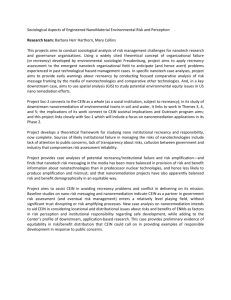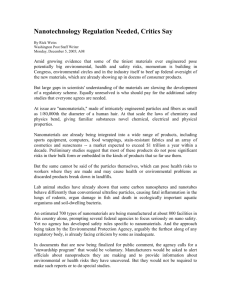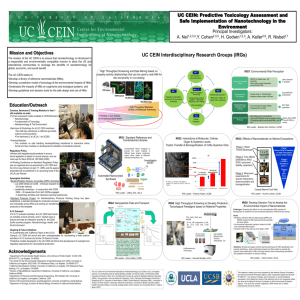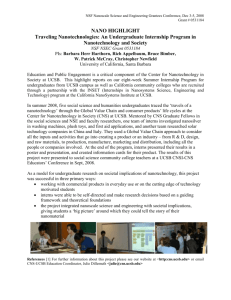Presentation slides - UC Mexus - University of California, Riverside
advertisement
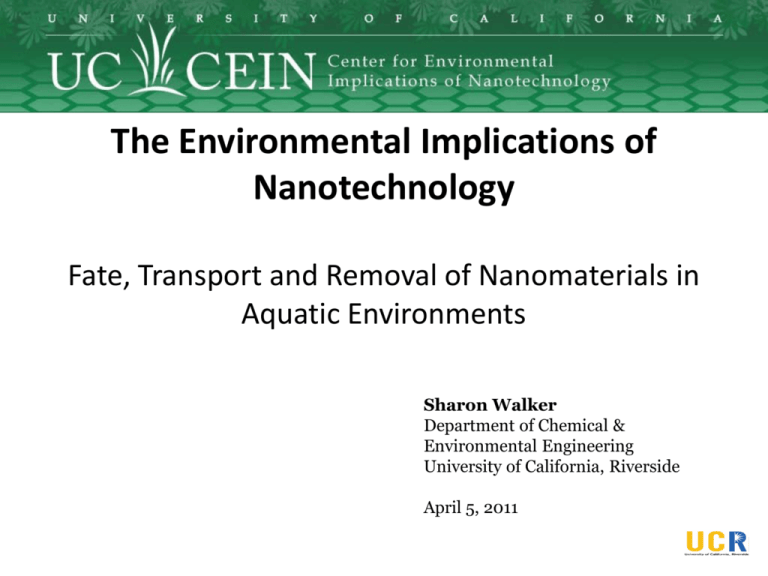
The Environmental Implications of Nanotechnology Fate, Transport and Removal of Nanomaterials in Aquatic Environments Sharon Walker Department of Chemical & Environmental Engineering University of California, Riverside April 5, 2011 Office of Basic Energy Sciences Office of Science, U.S. DOE Version 05-26-06, pmd http://wilsoncenter.org/nano Introduction - Novelty • Unusual physicochemical properties o o Small size, surface structure, chemical composition, bulk vs. nano May be a dry powder suspended in a gas (nanoaerosol), suspended in liquid (nanohydrosol), or embedded in a matrix (nanocomposite) • Applications o o o o o Medicine Energy Electronics Consumer products Environmental applications Quantum Dots TiO2 Fullerene(Buckey ball) Quantum dot Carbon Nanotube Chen and Elimelech, Langmuir 2006; Saleh et. al, ES&T 2010; Quevedo and Tufenkji, ES&T 2009 Introduction - Toxicity • Evidence of toxicity o o o Carbon nanotubes, ZnO and TiO2 cytotoxic to bacteria, mice, rats (Xia et. al, ACS Nano 2008; Kang et. al, Langmuir 2007) Fullerene “bucky balls” toxic to fish and humans (Wiesner et. al, ES&T 2006) Quantum dots (Cd) and nanosilver (Ag) toxic due to metal release (Mahendra et. al, ES&T, 2008; Benn and Westerhoff, ES&T 2008) Growth of Nanotechnology Robichaud et al, ES&T, 2009 Growth of Nanotechnology http://wilsoncenter.org/nano Framing the Research Strategy Risk Assessment Process 2011 NNI Environment, Health, and Safety Research Strategy www.nano.gov Integrated Research Framework Life Cycle Stages Adapted from UC CEIN Traditional Toxicological Approach Hazard Identification Exposure Assessment Risk Characterization Risk Management Failure to address Industrial Chemical Toxicology at the scale of production 50,000 + chemicals registered for commercial use in the US < 1,000 have undergone toxicity testing Overwhelming of resources: each test • $2-$4 million (for in vivo studies) • > 3 years to complete Mission of the UC Center for the Environmental Implications of Nanotechnology (UC CEIN) The mission of the UC CEIN is to insure that nanotechnology is introduced and implemented in a responsible and environmentally-compatible manner to allow the US and the International community to leverage the benefits of nanotechnology for global economic and social benefit Objectives of the UC CEIN • Develop a library of reference NMs • Understand the impacts of different types of NMs on organisms and ecological systems • Develop a predictive model of toxicology and environmental impacts of NMs • Develop guidelines and decision tools for safe design and use of NMs Collaborations with Institutions Worldwide Shared Facilities Synthesis & Characterization • Molecular Foundry (LBNL) • CNSI (UCLA & UCSB) • Center for Accel Mass Spec (LLNL) • CNSE (UCR) • I/UCRC (Columbia U) • FIMS (Bremen U) • NYU (Singapore) Fate & Transport • • • • Nano-Bio Interfacial Forces Lab (UCLA) Fate & Transport Labs (UCR, UCSB) Water Quality Research Lab (UCLA) Somasundaran’s Lab (Columbia U) UC CEIN Central Facilities • High Throughput Screening • Shareable Database • Modeling Framework • NCEAS infrastructure Ecotox • Micro-Environ Imaging Facility (UCSB) • Bodega Bay Marine Lab (UC Davis) • Sandia Biocharacterization lab • Subcell to Organism In Vivo Imaging • Ecotox Lab at UCSB • New shared lab space at UCSB Research has a Goal….. IRG1 NM characterization Interactions at molecular, cellular, organ and systemic levels IRG2 Public Academia Organismal & community ecotoxicology IRG3 Knowledge Education Outreach IRG4 Industry IRG5 Government NM fate & transport HT screening (Data generation for NM QSARs) IRG6 Modeling of the IRG7 Environmental Multimedia NM Distribution & Toxicity Risk perception High Throughput Screening and Data Mining based on QSAR relationships that can be used to rank NM for risk and priority in vivo testing 100’s/year 1000’s/year 10,000’s/day Immediate Relevance 100,000’s/day High Throughput Cellular or Molecular Screening Prioritize in vivo testing Predictive Mechanism-based Toxicological Approach Hazard In vitro testing: • Mechanisms/pathways • Material Libraries • Bacteria/Cells/Embryos • High content or HTS Representative in vivo testing: • different trophic levels • Food webs • DEB Modeling etc Hazard Identification & scoring Transport & Fate: • Material Libraries • Phys chem features • Sources • Life cycle Risk Reduction & Prediction • Safe Design • Limit exposure Emerging patterns Advanced computational modeling and expert system • Probabilistic Risk Modeling • Risk Perception Predictive Mechanism-based Toxicological Approach Hazard In vitro testing: • Mechanisms/pathways • Material Libraries • Bacteria/Cells/Embryos • High content or HTS Representative in vivo testing: • different trophic levels • Food webs • DEB Modeling etc Hazard Identification & scoring Transport & Fate: • Material Libraries • Phys chem features • Sources • Life cycle Risk Reduction & Prediction • Safe Design • Limit exposure Emerging patterns Advanced computational modeling and expert system • Probabilistic Risak Modeling • Risk Perception Transport and Fate of Nanomaterials in Aquatic Environment Transport through porous media Source: UC CEIN (modified) Objectives Goal: To shed a light on fundamental mechanisms governing fate, transport and removal of engineered nanomaterials in both natural and engineered environment Objective 1: Development of standard handling approach for consistent nanoparticle dispersion: Effects of sonication, NP type and concentration Objective 2: Determination of fundamental mechanisms in transport and removal of nanoparticle: Role of nanoparticle concentration, solution chemistry, and hydrodynamic effects Objective 3: Evaluation of influence of natural organic matter and bacteria in transport and removal of nanoparticle Experimental Approach - Transport System 1: Packed-Bed Column System 2: Radial Stagnation Point Flow Inlet Inlet Outlet Ideal Spherical Collector Saturated only Outlet System 3: Parallel Plate Flow Inlet Outlet kRSPF kPP Saturated kd = - (u/εL) ln (C/C0) 40x Experimental Approach - Characterization • • • • Transmission Electron Microscopy (TEM) Electrokinetic Characterization (ZetaPALS) Potentiometric Titration Inductively Coupled Plasma Atomic Emission Spectroscopy (ICP-AES) • Thermogravimetric analysis • Stability o Aggregation (Dynamic Light Scattering) o Sedimentation (Absorbance) Representative Results 1 mM 10 mM 1.0 SRHA 1 mg/L 0.8 0.8 0.6 0.6 0.4 C/C0 C/C0 A KCl 0.2 0.0 0.0 2 4 6 8 Pore Volume 10 12 10 mM No SRHA B SRHA 1 mg/L CaCl2 0.4 0.2 0 0 2 4 6 8 10 12 Pore Volume 8.0x10-7 7.0x10-7 pH 7 Column 10 mM KCl only -7 6.0x10 5.0x10-7 kpp(m/s) • NP transport in soils depends on groundwater constituents • Transport reduced in the presence of Ca2+ • Humic acid (NOM) is important when K+ present, less for Ca2+ • Parallel plate setup can produce rapid results that correlate with soil column studies 1 mM No SRHA 1.0 4.0x10-7 10 mM KCl + 1 mg/L SRHA 10 mM CaCl2 only -7 3.0x10 2.0x10-7 1.0x10-7 0.0 10 mM CaCl2 + 1 mg/L SRHA Parallel Plate Overall Summary and Ongoing Work • Microscope-based transport approach is promising to understand fundamental mechanisms • Overall, transport and removal of nanomaterials is a function of several parameters including NP type, NP concentration, solution chemistry (pH, IS, valence) and presence of organic matter • NOM, pH, and aggregation of NP seem to be the most significant parameters for transport of metal oxide nanomaterials • In future, influence of primary particle size and bacteria on NP transport will be investigated. Acknowledgements • • • Walker lab: • Indranil Chowdhury • Dr. Yongsuk Hong • Ryan J. Honda, James Kim, Chad Thomsen Funding o UC CEIN (NSF & EPA) UC CEIN o Andre Nel, UCLA School of Medicine (anel@mednet.ucla.edu) o Arturo Keller, UCSB Bren School for the Environment (keller@bren.ucsb.edu) o Hilary Godwin, UCLA Public Health (hgodwin@ph.ucla.edu) o David Avery, Chief Administrative Officer (avery@ucla.edu) NSF: EF-0830117 Thank you Carbon Nanotubes
